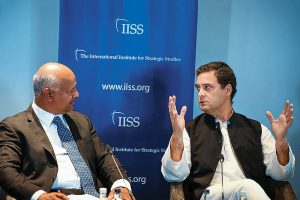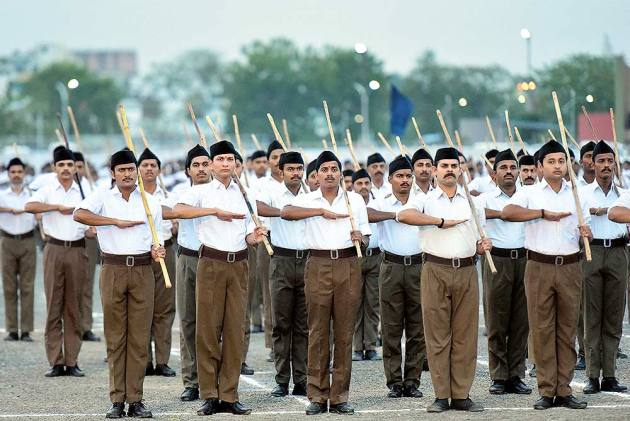BARRED: Bearing arms is the exclusive privileged of India’s armed forces and the police. Private groups like the Sanatan and the RSS must be banned from use of arms
With his speech at the second World Hindu Congress (WHC) in Chicago to celebrate the 125th anniversary of swami Vivekananda’s address to the Parliament of World Religions, Mohan Bhagwat has confirmed the RSS’ Hindutva agenda of an exclusive Hindu state where there will be no place for minorities or Dalits
For decades considered to be working behind thick veils of secrecy — impenetrable and impervious to light — the Rashtriya Swayamsevak Sangh (RSS) has lately found itself in the centre of much public attention. With the Narendra Modi government in its fourth year — as muscular a presence as ever — interest in the ruling BJP’s ideological fountainhead has only burgeoned. For the first time perhaps, it seems to be reciprocating — by encouraging a kind of wider engagement, inviting other voices to a tentative dialogue, eager to dispel the fear.
‘Mainstreaming’, though, will call for clarity on a host of questions. Does the Sangh interfere in governance? Does its political writ outline the limit of possibility for any government under its broad mandate? Does its Hindutva agenda, with the final goal of an Akhand Hindu Rashtra, form the governing spirit for regimes otherwise sworn to India’s secular Constitution? Does that not make for a split personality? If its cadres help the BJP during elections, can it claim to be apolitical, and merely a cultural and social organisation? How did its chief Mohan Bhagwat claim the RSS is capable of raising a fighting force for the country in three days? Does its authority, such as it is, lie outside and parallel to India’s statuted frameworks?
On the social side, is the RSS anti-Dalit, anti-Muslim? Does the “fringe” accused of lynching in the name of gau

raksha derive their sense of entitlement from the Sangh? What its stand on reservations? Several in the BJP believe Bhagwat’s statement asking for a review of the reservation policy in the middle of 2015 Bihar elections perhaps cost the party.
And then, what drives RSS cadres to work in remote tribal areas, run Ekal Vidyalayas, or provide relief during disasters, like in Kerala now and a string of places over the decades? What leads some affiliates to take an almost Gandhian line in economic policy, quite at variance with the freemarket-loving political wing? What is the nature of their collective being? Which is the real Sangh? Or is all of it real, making the Sangh Parivar one of the most complex and enigmatic organisations?
OUTREACH
Seeks before Congress president Rahul Gandhi made a scathing attack on the RSS in Europe, comparing it to the Arab world’s Muslim Brotherhood, Sangh leaders had been working on an outreach programme to explain their perspective on issues and their ideology.
In a first-of-its-kind programme, the Sangh has announced a lecture series — ‘Future of Bharat: An RSS perspective’ — to be held from September 17 to 19 in the capital, which will be addressed by Bhagwat. Rahul Gandhi may be invited along with other political leaders and prominent citizens, to interact with Bhagwat, and try and understand the Sangh. Almost as a prelude, industrialist Ratan Tata shared a stage with Bhagwat in Mumbai last week and, of course, in June former president and long-time Congressman Pranab Mukherjee made a splash by addressing new ‘graduates’ at the RSS headquarters in Nagpur.
“There’s a growing eagerness among large sections of society, including intellectuals and the youth, to understand the RSS perspective. There has been a lot of debate over the RSS and its role. The RSS realises that it’s time to address these in public,” Sangh prachar pramukh (publicity in-charge) Arun Kumar said at a briefing this week. He, of course, attributed Rahul’s statements to “ignorance”.
“To understand the Sangh, he has to understand India first. He himself has said he’s trying to understand India. Let him figure India out first. He perhaps doesn’t even understand the Muslim Brotherhood or ISIS, how much the world is affected by them and by terrorism. If he did, he wouldn’t have made the comparison,” the RSS spokesperson added.
On Rahul’s part, the comparison seems part of a well-formulated strategy — rather than stemming from “ignorance”. He has been consistently attacking the RSS for being divisive and spreading hatred. On August 28, after the arrest of five civil right activists, he had another dig at them. He has repeatedly pointed to a pervasive institutional capture by the RSS. He even launched a ‘Save the Constitution’ campaign, claiming all institutions like the Supreme Court were under threat, of being destroyed with figures close to Sangh ideology installed everywhere.
As a political voice, Rahul is expected to err on the side of rhetorical overstatement. But on the question of RSS, he would find a degree of consonance in several quarters. Eminent historian Prof Irfan Habib, for one, believes

the comparison with the Muslim Brotherhood is perhaps not appropriate. “Actually, the Muslim Brotherhood is a milder organisation. It’s not a terrorist organisation. It’s close to the ruling AKP in Turkey, and Hamas in Gaza is its branch,” says Habib.
He then refers to Sardar Patel’s famous points of critique. “They swear by Sardar Patel but he’s the man who banned the RSS after Mahatma Gandhi’s assassination. He wrote in a letter to M S Golwalkar (then RSS chief) how RSS men had attacked Muslims and distributed sweets after Gandhi was killed,” says Habib. In the letter, written on September 11, 1948, Patel appreciated the work done by young RSS men during Partition violence — “protecting women and children”. Then Patel added: “But the objectionable part arose when they, burning with revenge, began attacking Mussalmans. Organising Hindus and helping them is one thing but going in for revenge for its sufferings on innocent and helpless men, women and children is quite another thing.”
TOO TOLERANT TO VIOLENCE
This, then, is the core of the issue — what Habib calls the RSS’s “very tolerant view” about violence against others. Referring to the reality of cow lynchings and such like, he is sceptical of what the lecture series could achieve. “If the formal RSS comes out and engages, it doesn’t mean much. It is its subsidiaries that comprise the gau rakshaks, etc. It has been the same since colonial times, even though they didn’t have so many subsidiaries then. That part remains secret — more in the character of Ku Klux Klan, not the Muslim Brotherhood,” he adds.
Scholar Walter Andersen, who has authored a definitive book on the RSS, is inclined to exonerate the Sangh of direct complicity in lynchings and such violence. The leadership of both the RSS and the BJP are embarrassed by these incidents, he says. “I have spoken to top leaders who say such violence should be prohibited. The ousting of former VHP chief Pravin Togadia is an example. RSS leaders I spoke to said Togadia was taking rash steps, and advocating violence for cow protection. His actions were affecting RSS’s efforts to be more acceptable. The RSS is an evolutionary group, not revolutionary,” says Andersen.
Political scientist Suhas Palshikar lights upon a parallel aspect. “If a comparison has to be made, it should be with Christian missionary organisations. The RSS undertakes missionary type of activities with their work in tribal areas and social and cultural spheres,” he says.
That philanthropic bit got inadvertent notice in flood-affected Kerala last week when a WhatsApp audio, purportedly recorded by a commoner, asked for contributions to Sangh affiliate Seva Bharati. Though the audio got a lot of flak when it was revealed to be by a BJP IT cell honcho, even critics conceded Seva Bharati does exemplary relief work. In Karnataka’s flood-affected Kodagu, it even teamed up with an Islamic NGO for humanitarian work.
Palshikar does find Rahul’s continuing broadside on the RSS “remarkable”. Instead of trying to avoid controversy, he has taken the issue by the horns — “an important political initiative”, considering the currently weak position of his party, Palshikar says. “At one level, I appreciate his effort. It drives home the point that the RSS controls the BJP. He’s forcing it to come out from behind the mystical curtain it operates from. The RSS wants to bring together all Hindus for political purposes. Yet it calls itself a cultural organisation, and talks about nationalism. What is nationalism? Isn’t it about politics,” asks Palshikar, currently chief editor, Studies in Indian Politics.
He also finds its attempt to engage with the public interesting, saying it was not part of Sangh culture earlier. “Talking about their work and popularising themselves was not important for the RSS earlier. It’s only now that they have started becoming conscious about the public opinion. It has become more political, so to say,” Palshikar says. An agitational politics to popularise Hindutva ideology having found a great degree of success, it’s now striving for a further acceptance and mainstreaming.

“There’s no doubt that the September conclave has been carefully timed just before the elections. The RSS claims they are not bothered about politics but these elections are more crucial than any other for them. After the proximity to state power, it’s important for them that the BJP continues in power. This public interaction is the beginning of the 2019 campaign,” says the political scientist.
HITTING BACK AT RAHUL
BJP general secretary Muralidhar Rao, an old Sangh hand who did time first with the ABVP and then the Swadeshi Jagaran Manch (SJM), pooh-poohs Rahul’s attack as deliberate misinformation. “Rahul understands the strong anti-ISIS sentiments in the West, and wants to encash on it. He wants to create a perception in the western liberal, democratic world that RSS stands for something and the Congress is its antithesis. It’s a completely wrong picture,” explains Rao.
“Even Nehru may have differed with the RSS but never termed it anti-national. Or he wouldn’t have invited the RSS for the Republic Day marchpast in 1963. There can be ideological differences but that doesn’t mean one can compare RSS to the Muslim Brotherhood. That organisation is banned in many countries,” Rao tells Outlook. Indeed, there are other crucial differences, and not just one of degree. The Brotherhood, or even ISIS, are by nature internationalist, whereas national boundaries are an article of faith for the RSS.
Rao talks about three attempts by the Congress to ban the RSS — each time it failed to defend the move in court. “In over 70 years, they have not been able to convince the courts — not even when they had 400 MPs,” the BJP office-bearer says. “Even now Rahul cannot defend what he has said on foreign shores. It is despicable.” Rao believes Rahul is in a hurry to capture the vacant anti-BJP space. “There is no acceptable leader yet (to lead the Opposition against the BJP), and no endorsement of his leadership either. He wants to become a hero in that space,” he adds.
Keeping up the artillery fire on the RSS has been a long Congress pastime. Nehru may have kept communication lines open, but critics abounded even after him. Vijay Chauthaiwale, another BJP leader from the Sangh stable, talks of Subhadra Joshi (MP) who used to target the RSS regularly at the peak of the Indira Gandhi era.
“The so-called liberals and pseudo-secularists become Insecure when they see the RSS gaining greater acceptability. It’s not enough for Rahul to attack the BJP, you see. It has to be the RSS — a message to the Muslims to come closer to the Congress. He doesn’t seem to care that it portrays India in a very poor light. Such sweeping remarks about unemployment, ISIS and Muslim Brotherhood are in very poor taste,” says Chauthaiwale, in-charge of foreign affairs in the BJP.
Balashankar, RSS ideologue and member of BJP’s central committee on training, says the best way to treat Rahul’s statements is to ignore them. “He seems to be practising a new election strategy, like in the US, of saying atrocious things just to grab headlines. What he said about the RSS, Muslim Brotherhood and ISIS is absurd. The situation in India is completely different. People, including Muslims, are not becoming terrorists because of unemployment,” he tells Outlook. “The BJP should ignore him. Or else he gets what he wants — headlines.” He’s right there. The rhetoric is getting him — and the RSS — headlines, and at an interesting turning point in Indian politics.
Courtesy: Outlook India
